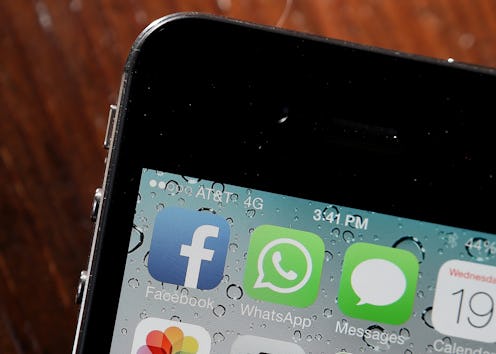Adding an emoticon to your Facebook status is a common way to describe how you're feeling... but why on earth do Facebook's options include emoticons for "fat" and "ugly"? The activist group Endangered Bodies thinks it's as awful as you probably do — which is why they're spearheading the campaign #FatIsNotAFeeling, which calls for the removal of the "fat" and "ugly" emoticons. An international movement that is seeking to be a force of positive body image, Endangered Bodies calls for women to "dare to enjoy their bodies"; and they're definitely not the only ones who think those two emoticons are all wrong. More than 12,000 people have signed the petition so far — and they're right: "Fat" is not a feeling.
The group states that while emoticons expressing things like sadness, happiness, and impatience highlight actual feelings, ones that express being "fat" and "ugly" don't do anything but advocate self-loathing. One of the petition's authors on the official Change.org page writes, "When Facebook users set their status to 'feeling fat,' they are making fun of people who consider themselves to be overweight, which can include many people with eating disorders. And that is not OK." She notes that she herself has faced a struggle with an eating disorder in the past, making it a deeply personal issue for her.
The fact that Facebook even thought to include such emoticons speaks to larger issues of body image which affect everyone; women in particular often bear the brunt of it, though, not only being expected to conform to certain standards of beauty, but also to hate their bodies if they don't fall within them. Although this issue might seem petty or irrelevant, it's connected to the larger discussion about unrealistic beauty standards. So in the spirit of body positivity, here's a list of five reasons why I believe Facebook should ban these emoticons:
1. Fat is Not Something to Fear
Fatphobia is defined as the collective cultural fear and hatred of fat people, but fat is not a monster hiding under your bed at night. Most will argue that their fear or disgust stem from the health concerns that come with being overweight, but many of those have been debunked or disproven. For example, a 2000 study showed that it was fitness, not size, that lengthened life expectancy and the definition of fitness can include fat individuals.
Even if you have a strong stance on obesity, that doesn't mean you need to live in fear of your fat. Everyone has fat and embracing it is going to leave you a lot happier.
2. All Bodies Deserve Respect
As the folks from Endangered Bodies remind us, "All bodies deserve to be respected and cared for." Respecting your body should be something all of us do, no matter what our sizes. Why would you want to disrespect the very thing that gives you life? Instead of letting fat rule your life, learn to appreciate what it provides for you: warmth, protection, and gives you brain power (70 percent of your brain is composed of fat!).
3. We're Already Trapped in a World of Comparisons
We've probably all had times when we've looked at our Facebook feeds and felt bad about ourselves after comparing our friends' vacations, weddings, and job offers to our boring day-to-day existences. Numerous studies have shown that comparing your life to others leads to low self-esteem; we've even previously reported on the effects that looking at others' Facebook pictures can have on your body image. Reporting feeling fat or ugly on our Facebook statuses can only encourage you to do this even more.
4. Language Is Powerful and What We Say Matters
If there's one thing I can't stand, it's the phrase "sticks and stones can break my bones but words can never hurt me." This is absolutely not true. Language is powerful, and what we say can even change the course of people's lives. I'm sure we've all had both positive and negative comments directed as us that we remember for life. Self-talk is just as impactful as what others say. Talking about yourself in a negative way is not going to produce productive results in any case, so Facebook shouldn't be encouraging it.
5. Fat Discrimination Is Real
One of the main premises behind #FatIsNotAFeeling is that it reinforces the stigma that fat people face. While it might seem easy to discount, numerous studies have shown that it's not only real, but moreover, that it has real impact on people's lives — from earning less money to being disrespected by doctors. In fact, it's the fourth most common type of discrimination in the US. By saying that you feel fat on Facebook, you're reinforcing this idea that being a fat person is a bad thing.
If you want to join me in signing the petition that asks Facebook to get rid of its "fat" and "ugly" emoticons, you can find it on Change.org.
Images: Giphy (4)
